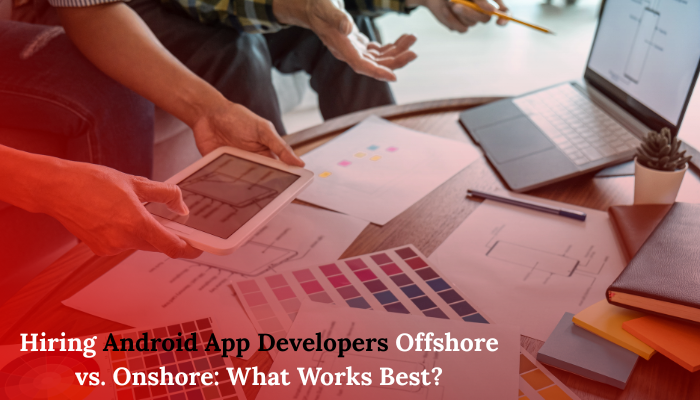Building an app isn’t just about good design or slick features it’s about having the right talent behind the scenes. One of the first decisions a company must make when planning mobile development is whether to hire offshore or onshore talent.
When looking to bring an Android app developer on board, understanding the pros and cons of each hiring route can save not just time and money, but also future headaches. This guide breaks down the key differences and helps you decide what hiring model aligns best with your goals.
Let’s compare offshore and onshore hiring across critical factors that impact project success.
1. Cost Comparison: Offshore Android App Developers vs. Onshore Talent
Cost is often the deciding factor for businesses when choosing between offshore and onshore teams. Hiring an offshore Android app developer can cost significantly less than hiring someone in-house or locally. This is particularly true when working with developers in countries like India, Ukraine, or the Philippines.
Why offshore might be more budget-friendly-
-
Lower hourly rates- Offshore developers can charge 40-70% less.
-
Access to global talent- No need to limit your search to local salary expectations.
-
Reduced overhead- No in-house expenses like office space or equipment.
However, while cost savings are attractive, they must be weighed against communication and time zone challenges. Onshore developers, although more expensive, are often easier to collaborate with in real-time.
2. Communication and Time Zone Alignment
Clear, real-time communication is crucial when working with an Android app developer especially on complex, iterative projects. Miscommunication can lead to delays, bugs, and features being built incorrectly.
Onshore benefits-
-
Shared language and cultural references.
-
Real-time meetings without the hassle of scheduling across time zones.
-
Easier access for face-to-face meetings, if needed.
Offshore considerations-
-
Time zone differences can delay feedback loops.
-
Language barriers may require additional effort to align on project requirements.
-
Cultural nuances can affect design sensibilities or UX decisions.
While many offshore developers adapt well to Western business practices, the communication gap can occasionally add friction to the development process.
3. Talent Pool and Availability of Android App Developers
When hiring an Android app developer, availability can be a major issue, especially in saturated markets. Countries like the United States and the UK often have a shortage of specialized mobile developers, driving up costs and wait times.
Offshore advantages-
-
Larger pool of skilled professionals.
-
Faster hiring turnaround.
-
Teams with experience in niche technologies or platforms.
Onshore hiring may come with a higher price tag and longer recruitment cycles.
However, developers may have better familiarity with regional compliance requirements and local market preferences.
4. Quality Assurance and Accountability
The quality of code and accountability can vary significantly between offshore and onshore developers. A competent Android app developer should not only write clean code but also follow best practices in testing and documentation.
Points to consider-
-
Offshore developers often work in team-based outsourcing firms, where project managers and QA specialists are included in the package. However, you’ll need to vet these vendors carefully.
-
Onshore developers are more likely to adhere to domestic regulations, security standards, and data compliance protocols.
Regardless of location, working with an established firm or thoroughly vetting freelance developers is crucial for maintaining quality.
5. Project Management and Collaboration Tools
Managing remote teams, especially when working with an offshore Android app developer, demands effective use of digital tools.
Whether you’re collaborating through Slack, Jira, Trello, clarity and consistency in communication are key.
Recommended tools for remote collaboration-
-
Version control- GitHub, Bitbucket
-
Task tracking- Jira, Asana, Trello
-
Communication- Slack, Zoom, Google Meet
-
Documentation- Confluence, Notion, Google Docs
With proper workflows in place, both offshore and onshore teams can deliver efficiently. However, the initial setup and alignment often require more effort with offshore teams.
6. Legal Considerations and Intellectual Property Protection
When hiring an Android app developer, safeguarding your app’s source code, algorithms, and business logic is paramount.
Legal and IP protection aspects-
-
Onshore hiring ensures you’re working within a familiar legal framework.
-
Offshore arrangements may require international contracts and NDAs.
-
Legal enforcement in case of IP breach is generally easier domestically.
If you’re dealing with sensitive or proprietary data, onshore development might offer better peace of mind. For offshore, always involve legal counsel familiar with international contracts.
7. Long-Term Maintenance and Support
Apps are living entities they require updates, bug fixes, and support after launch. Whether you choose an offshore or onshore Android app developer, consider their availability and willingness to stay engaged post-deployment.
Why this matters-
-
Offshore teams might be more available for 24/7 support due to different time zones.
-
Onshore developers may offer dedicated service-level agreements (SLAs) for ongoing maintenance.
-
Ensure your contract clearly outlines support expectations, response times, and pricing.
Choosing a developer or agency with a long-term vision helps you avoid the cost of context-switching between vendors later.
8. Cultural Fit and Business Alignment
Beyond technical skill, the cultural fit of an Android app developer can impact productivity and collaboration. Working with someone who understands your business values, industry, and customer expectations leads to smoother development cycles.
Why onshore may align better-
-
Familiarity with local user behavior and UX standards.
-
Better understanding of regulations like GDPR, HIPAA, or PCI-DSS.
-
Shared holidays, schedules, and workflows.
However, many offshore developers now receive cross-cultural training and work with international clients, minimizing these gaps.
9. Speed to Market
When you’re racing against time to launch your product, Hire Android app developer can speed up delivery significantly.
-
Offshore pros- Large teams, scalability, and rapid development cycles.
-
Onshore pros- Faster approvals, fewer delays due to communication, and streamlined legal checks.
The right choice often depends on the scope and urgency of your app project.
Among hundreds of Android App Development outsourcing companies in India, Invedus is one of the most preferred options for Start-ups, SMEs and eCommerce organizations. Invedus has continuously improved the quality of its services and achieved many milestones. At Invedus, they are proud of our Offshore employees, who passionately devote themselves to bring the best results to the project at hand. Their dedicated Android Developers in India have successfully developed 350+ applications in various business verticals.
To Wrap Up
There’s no one-size-fits-all answer when hiring an Android app developer. Offshore hiring works well for companies with budget constraints, clear project scopes, and access to good project management. Onshore hiring is better suited for businesses seeking higher levels of collaboration, accountability, and legal safety.





